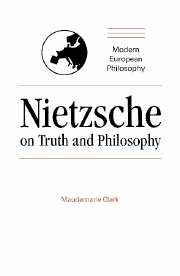Book contents
- Frontmatter
- Contents
- Preface
- Note on texts and citations
- Chapter 1 Interpreting Nietzsche on truth
- Chapter 2 Nietzsche and theories of truth
- Chapter 3 Language and truth: Nietzsche's early denial of truth
- Chapter 4 The development of Nietzsche's later position on truth
- Chapter 5 Perspectivism
- Chapter 6 The ascetic ideal
- Chapter 7 The will to power
- Chapter 8 Eternal recurrence
- Bibliography
- Index
Chapter 6 - The ascetic ideal
Published online by Cambridge University Press: 04 December 2009
- Frontmatter
- Contents
- Preface
- Note on texts and citations
- Chapter 1 Interpreting Nietzsche on truth
- Chapter 2 Nietzsche and theories of truth
- Chapter 3 Language and truth: Nietzsche's early denial of truth
- Chapter 4 The development of Nietzsche's later position on truth
- Chapter 5 Perspectivism
- Chapter 6 The ascetic ideal
- Chapter 7 The will to power
- Chapter 8 Eternal recurrence
- Bibliography
- Index
Summary
The most important remaining objection to my interpretation of Nietzsche's mature view of truth concerns its compatibility with his account of the ascetic ideal, in particular, with GM III's extended analysis of the faith in truth as the latest expression of the ascetic ideal. Walter Kaufmann defends Nietzsche as one who believed in truth by portraying him as a proponent of the ascetic ideal (1974, 245, 359–61; 1968a, esp. 584 ff.) Because I argue (in sections 1 and 2 of this chapter) that Nietzsche opposed all versions of the ascetic ideal, I must find some other way of reconciling his analysis of the faith in truth with my claim that he accepts the existence of truth.
Quite apart from the defense it provides of the interpretation I have already given, my account of Nietzsche's analysis of the ascetic ideal plays a central role in this study. It takes us beyond the arguments I have already given to Nietzsche's ultimate reason for rejecting the metaphysical correspondence theory – not simply that it involves an internal contradiction (which I have argued he thinks it does), but that it reflects and is used to support an ideal he opposes and considers dangerous. It thereby gives Nietzsche's explanation for how it is that so many brilliant philosophers have found themselves bewitched by what he considers nonsense (section 3).
- Type
- Chapter
- Information
- Nietzsche on Truth and Philosophy , pp. 159 - 204Publisher: Cambridge University PressPrint publication year: 1991



